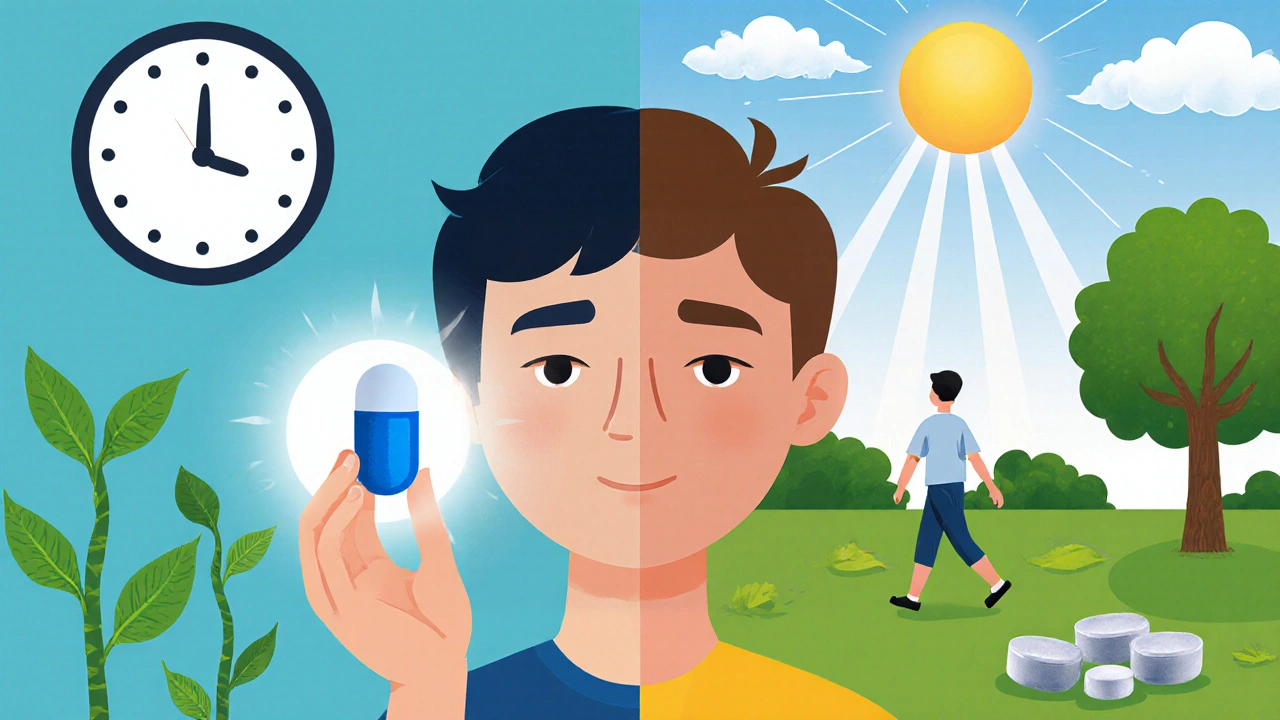 31
Oct,2025
31
Oct,2025
Feeling anxious isn’t just stress-it’s your body stuck in fight-or-flight mode, even when there’s no real danger. If you’ve tried deep breathing, meditation, or chamomile tea and still feel on edge, you might be wondering: should you try buspirone, or stick with natural options? There’s no one-size-fits-all answer. But understanding how each option works-and what they cost your body and mind-can help you choose wisely.
What is buspirone, really?
Buspirone is a prescription medication approved by the FDA for generalized anxiety disorder (GAD). Unlike benzodiazepines like Xanax or Valium, it doesn’t cause sedation or dependence. It doesn’t work like an antidepressant either. Instead, it targets serotonin receptors in the brain, specifically the 5-HT1A receptor, to calm overactive anxiety signals. It’s not fast-acting. Most people don’t feel relief until after two to four weeks, and full effects can take up to six weeks.
It’s not a quick fix. But if you’ve had bad reactions to SSRIs or can’t tolerate the withdrawal symptoms from benzos, buspirone offers a middle ground. A 2023 meta-analysis in the Journal of Clinical Psychiatry found buspirone reduced anxiety symptoms by about 40% in GAD patients over 12 weeks-comparable to SSRIs but with fewer sexual side effects and no risk of addiction.
Side effects? Dizziness, headache, nausea, and sometimes mild insomnia. About 1 in 10 people stop taking it because of these. It’s not for everyone, but for many, it’s a safe long-term option.
What natural remedies actually work for anxiety?
When people say "natural," they often mean herbal supplements, lifestyle changes, or mind-body practices. Not all of them are backed by science. But a few have solid evidence.
L-theanine-an amino acid found in green tea-has been shown in multiple double-blind studies to reduce cortisol levels and promote calm without drowsiness. A 2022 trial with 102 adults found 200 mg of L-theanine daily lowered anxiety scores by 35% over eight weeks.
Valerian root is often used for sleep, but it also helps with daytime anxiety. A 2021 review in Phytomedicine found it as effective as low-dose benzodiazepines for mild-to-moderate anxiety, with fewer next-day grogginess issues.
Passionflower has been used for centuries in Latin America. A 2020 study comparing it to oxazepam (a mild anti-anxiety drug) found passionflower worked just as well over four weeks, with fewer reports of drowsiness.
Then there’s magnesium. Many people are deficient, and low magnesium is linked to higher anxiety. Supplementing with 200-400 mg of magnesium glycinate daily can help regulate the nervous system. One 2023 trial showed a 50% reduction in anxiety symptoms in adults with low baseline magnesium levels.
And let’s not forget exercise. Thirty minutes of brisk walking five days a week lowers anxiety as effectively as medication for many people. It boosts endorphins, reduces cortisol, and improves sleep-all things that break the anxiety cycle.
How do they compare?
Here’s how buspirone stacks up against the most effective natural options:
| Feature | Buspirone | L-theanine | Valerian Root | Passionflower | Magnesium Glycinate |
|---|---|---|---|---|---|
| Time to work | 2-6 weeks | 1-2 hours (acute), 2-4 weeks (chronic) | 1-2 weeks | 1-2 weeks | 2-4 weeks |
| Effectiveness (avg. symptom reduction) | ~40% | ~35% | ~30-40% | ~35% | ~50% (in deficient individuals) |
| Side effects | Dizziness, nausea, headache | Very rare | Mild drowsiness | Mild drowsiness | Diarrhea (high doses) |
| Addiction risk | None | None | None | None | None |
| Cost (monthly) | $15-$40 (with insurance) | $10-$20 | $10-$18 | $12-$22 | $8-$15 |
| Prescription needed? | Yes | No | No | No | No |
Buspirone is more consistent in its results, especially for moderate to severe anxiety. Natural options are gentler, safer long-term, and often improve sleep and digestion too. But they’re not as powerful for acute panic or clinical anxiety disorders.
Who should choose buspirone?
If your anxiety is keeping you from work, relationships, or sleep-and you’ve tried therapy and lifestyle changes without lasting relief-buspirone might be the right next step. It’s especially good for people who:
- Can’t take SSRIs because of sexual side effects
- Have a history of substance use and want to avoid addictive medications
- Need something reliable for long-term management
- Are already seeing a doctor and want a science-backed option
It’s not for panic attacks. It doesn’t work fast enough for acute episodes. If you’re having panic attacks multiple times a week, your doctor might suggest something else first.
Who should try natural remedies first?
If your anxiety is mild to moderate, and you’re looking for something you can start today without a prescription, natural remedies are a smart place to begin. They’re especially good for people who:
- Prefer to avoid pharmaceuticals
- Want to improve overall health, not just reduce anxiety
- Have trouble sleeping and want a remedy that helps both
- Are pregnant or breastfeeding (some natural options are safer than meds)
- Want to build habits that last beyond medication
Combining L-theanine with daily walks and 10 minutes of breathing exercises can be just as effective as buspirone for many people. And you won’t need to worry about drug interactions or long-term side effects.
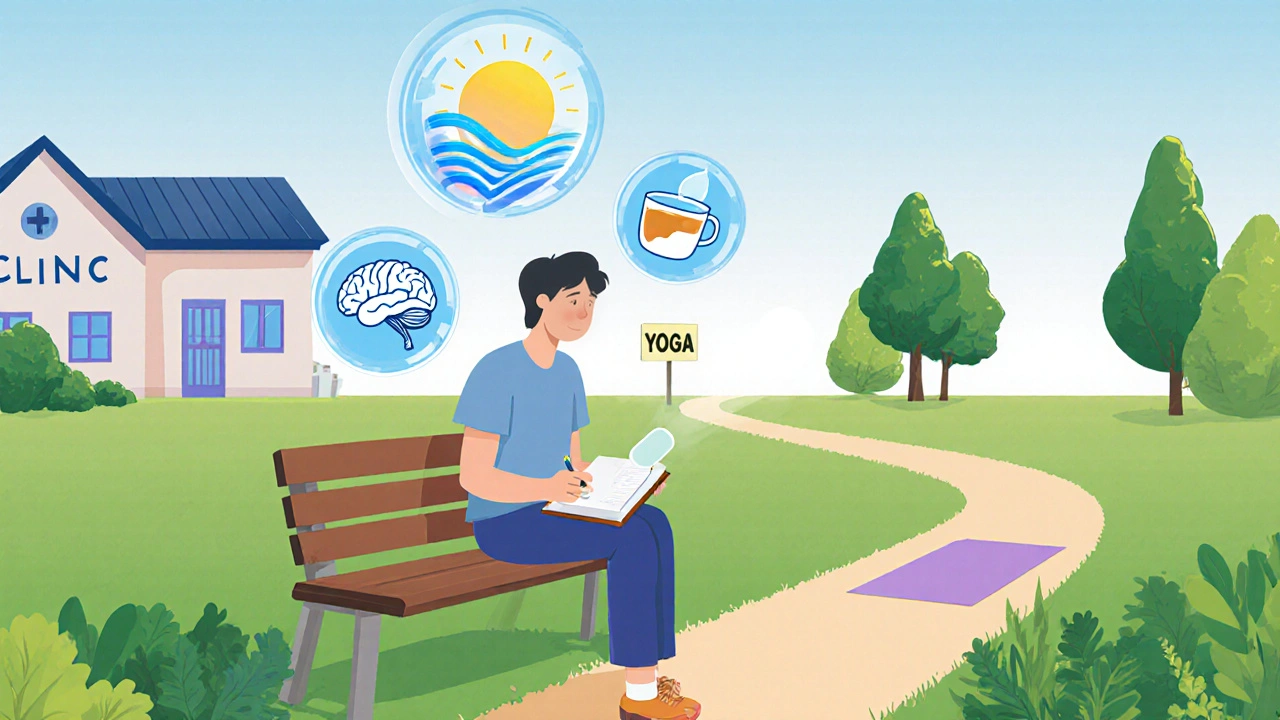
Can you use them together?
Yes-but carefully. Buspirone doesn’t interact badly with L-theanine, magnesium, or passionflower. But valerian root can increase drowsiness when combined with buspirone, especially if you’re already feeling tired.
If you’re thinking of mixing natural remedies with buspirone, talk to your doctor or pharmacist. Some herbal supplements affect liver enzymes and could change how buspirone is processed. St. John’s Wort, for example, should never be mixed with buspirone-it can cause serotonin syndrome, a rare but dangerous condition.
Most people who combine them use natural options to support their buspirone regimen-like taking magnesium to improve sleep or L-theanine for afternoon calm-while the medication handles the core anxiety.
What about therapy?
No medication or supplement replaces therapy. Cognitive behavioral therapy (CBT) is the gold standard for anxiety. It rewires how your brain responds to stress. Studies show CBT works as well as medication for most anxiety disorders-and the benefits last years after treatment ends.
If you’re considering buspirone, pair it with CBT. If you’re trying natural remedies, add CBT. Even just six sessions can make a huge difference. Many online platforms now offer affordable CBT programs, and some insurance plans cover them.
What’s the bottom line?
Buspirone is a reliable, non-addictive medication for persistent anxiety. It’s not perfect, but it’s one of the safest long-term options on the market. Natural remedies like L-theanine, magnesium, and passionflower offer gentler, holistic support-and work well for mild cases or as complements to other treatments.
The best choice depends on your symptoms, your goals, and your comfort level with medication. If your anxiety is mild and you want to avoid pills, start with natural options and therapy. If it’s severe and holding you back, buspirone might be the bridge you need to get back on track.
There’s no shame in either path. What matters is finding what lets you breathe again.
Can buspirone make anxiety worse at first?
Yes, some people report increased anxiety or dizziness during the first week or two. This is usually temporary as your body adjusts. If it lasts longer than two weeks or becomes unbearable, talk to your doctor. It doesn’t mean the medication isn’t working-it just might not be the right fit.
Are natural remedies safe during pregnancy?
L-theanine and magnesium glycinate are generally considered safe during pregnancy, with no strong evidence of harm. Valerian and passionflower have limited data, so most doctors advise caution. Always talk to your OB-GYN before taking any supplement while pregnant. Therapy and exercise are the safest first-line options.
How long should I try a natural remedy before giving up?
Give it at least four to six weeks. Natural remedies work gradually. If you don’t notice any change after two months, it’s unlikely to help. Keep a daily journal to track mood, sleep, and triggers-it helps you see patterns you might miss day to day.
Can I stop buspirone cold turkey?
Unlike benzodiazepines, buspirone doesn’t cause physical dependence. But stopping suddenly can cause rebound anxiety or dizziness. It’s best to taper slowly under your doctor’s guidance-usually reducing the dose by 5-10 mg every week.
Do natural remedies work for social anxiety?
They can help with general nervousness, but social anxiety often needs targeted therapy like CBT or exposure techniques. Natural remedies may reduce baseline anxiety, making therapy easier-but they’re not enough on their own for clinical social anxiety disorder.
Is buspirone better than SSRIs for anxiety?
It depends on your side effect tolerance. SSRIs work faster for some and are more effective for depression-anxiety combos. But buspirone has fewer sexual side effects, less weight gain, and no withdrawal symptoms. For people who can’t handle SSRIs, buspirone is often the next best choice.


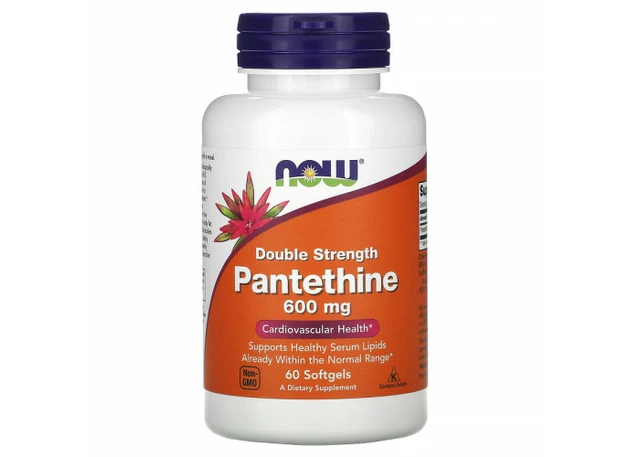
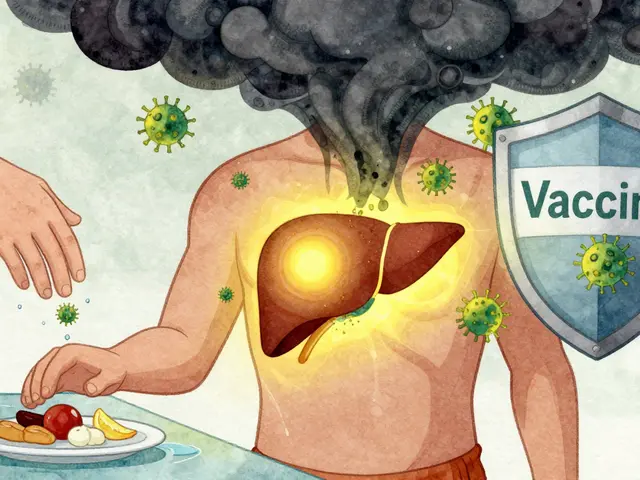
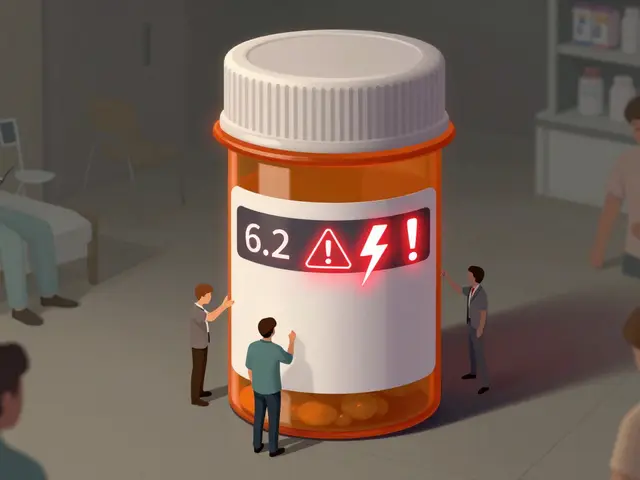

Thank you for this balanced breakdown. I’ve been on buspirone for six months and honestly, it’s been a game-changer-no brain fog, no weight gain, and I finally feel like myself again. I started with L-theanine and magnesium first, but my anxiety was too stubborn. Sometimes, you need a little help to get back on your feet.
Of course the pharma industry loves buspirone-it’s profitable, non-addictive, and keeps people dependent for life. Meanwhile, natural remedies like magnesium and L-theanine have been used for millennia. But you won’t hear that on Big Pharma’s sponsored studies. The FDA only approves what they can patent. Coincidence? I think not.
Interesting that you mention valerian root as comparable to benzodiazepines. Have you considered that the placebo effect may account for much of its perceived efficacy? I’ve seen too many patients waste months on herbal nonsense while their anxiety spirals. Real treatment requires structure, not tea bags.
Buspirone’s 5-HT1A partial agonism is key here-it’s not SSRIs so it avoids downregulation issues. L-theanine crosses BBB via LAT1 transporters and modulates GABAergic tone. Magnesium glycinate chelation improves bioavailability versus oxide. Passionflower’s flavonoids bind benzodiazepine sites. But none of this matters if you don’t pair it with CBT. Neuroplasticity is the real MVP. Skip the supplements if you’re not doing the work.
OMG YES I started taking magnesium and my anxiety just melted like butter on toast I swear I felt calmer in 3 days I’m never going back to pills!!!
Buspirone takes 6 weeks? That’s a lifetime when you’re drowning. Meanwhile, L-theanine works in an hour and costs less than a latte. Why are doctors still pushing slow meds? Lazy prescribing.
Anyone else notice how every natural remedy listed has a 2020-2023 study? That’s not science-that’s trend-chasing. Real medicine doesn’t need a new study every year to be valid. Buspirone’s been around since the 80s. Stick with what’s proven.
i just read this and now im crying because i tried all the natural stuff and it did nothing and i felt so guilty for wanting a pill but then i saw someone say its okay and now i feel less alone
It’s not about which is better-it’s about which path lets you breathe. Sometimes the pill is the bridge. Sometimes the tea is the anchor. Both can be sacred. What matters is you’re still trying. That’s courage.
Just wanted to say I’ve been on buspirone for 4 months and started adding L-theanine and walking every day. I feel 70% better. No magic bullet but the combo? Honestly life changing. Don’t give up if one thing doesn’t work right away. Keep tinkering. You got this.